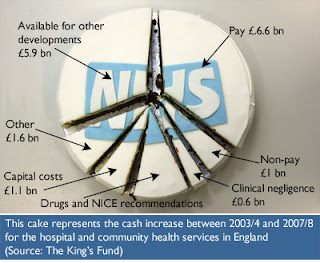Liberal Leader Stephen McNeil's remonstrations in the legislature this month condemning a year-old memo from some Capital District Health Authority physicians proposing a new, doctor-driven, private-public, "Mayo Clinic-like" hospital facility in metro were an emblematic example of the sort of backward, stick-in-the-mud attitudes and reactionary, tunnel-vision thinking that keep Nova Scotia an underachieving backwater.
McNeil trotted out the customary boilerplate about defending the sacrosanct public health care system from the evils of profit motive or market accountability, trotting out the old FUD (Fear, Uncertainty and Doubt) about privatization of health care delivery leading to (horrors!) - two-tiered health care, with NDP leader Darrell Dexter chiming in with his labour-union constituency's pet trope about private hospitals and clinics supposedly luring doctors and nurses away from the public system.
The 2006 memo, reportedly authored and signed by Capital Health surgeon Robert Stone, lays out a concept for clinics or centres that "should not be staffed by 'unionized' personnel
It would focus on providing endoscopy; breast health services; prostate therapy; various other diagnostics; orthopedic surgery, other same-day surgeries, and executive preventive health - all procedures that do not require the facilities of a fully-equipped and staffed, acute-care surgical hospital.
For which there is a strong demand that isn't being met in a timely fashion by the current public system, and which helps keep waiting lists long for other, more complex surgeries and treatments.
It's just, plain inefficient and a misuse of scarce resources.
Read the full story here
Monday, January 7, 2008
Does Halifax get its own Mayo Clinic?
Posted by
Guy Derla
at
7:56 AM
0
comments
![]()
Tags: Canadian health care system, Capital District Health Authority, clinics, Doctor, Halifax, Mayo Clinic, NDP, Nova Scotia, nurses, physicians, private clinic, private hospital, public health care system
Thursday, December 20, 2007
Premier Nova Scotia wants to allow more private competition in health care
 Rodney MacDonald, Nova Scotia's Premier, should be applauded for his openness to a greater role for private competition in health care.
Rodney MacDonald, Nova Scotia's Premier, should be applauded for his openness to a greater role for private competition in health care.
In his recent state-of-the-province address, he said specifically that the provincial government was moving towards a greater role for the private sector in the delivery of publicly funded health services.
For far too long, Canada has been out of step with the rest of the industrialized world in its steadfast opposition to tapping into the competitive market for solutions to our health care woes, to the detriment of both patients and taxpayers alike.
Consider for a moment what Canadians receive in return for this steadfast commitment to the status quo.
Among the 28 developed nations that have universal health insurance programs, Canada ranks third in age-adjusted health care spending as a percentage of GDP.
At the same time, Canadians endure relatively poor access to physicians and medical technologies, while wait times for health care in Canada are not just unacceptably long but are among the longest in the developed world.
Perhaps a closer look at why other countries are getting more for less is in order.
Among the world’s 28 most developed nations that have universal health insurance coverage like Canada, the majority allow private providers to deliver publicly funded services.
All of the nations that outperform Canada across several measures of mortality related to health system performance (Australia, Sweden and Japan) employ private competitive providers in the delivery of publicly funded health care.
Allowing private hospitals to compete for the delivery of publicly funded care is a proven policy that would improve the state of Medicare for all Canadians.
Premier MacDonald’s willingness to sit down and take an honest look at those policies that have worked so well elsewhere in the developed world, bodes well for both patients and taxpayers in Nova Scotia.
Read the full story here
Posted by
Guy Derla
at
12:14 PM
0
comments
![]()
Tags: Canadian health care system, health care, health insurance coverage, hospitals, medical technology, Medicare, Nova Scotia, patient, physicians, politics, public health care system, Rodney MacDonald
Monday, December 17, 2007
U.K. public health care system flops, unlike Canadian health care system
 Most Canadians are proud of their public health care system.
Most Canadians are proud of their public health care system.
It's paid for by everybody and used by everybody, it pools the cost of treatment and care.
Like every other health care system in the developed world it has its problems but, contrary to the claims of its enemies, it isn't in crisis.
Until recently, Britain has been like Canada.
Canada's National Health Service, despite its problems, is doing a good job and improving. But its future has been put at risk by the introduction of market forces and profit-seeking providers.
Some B.C. politicians and other private health care lobbyists are claiming that U.K. health care privatization is a success. Nothing could be further from the truth.
Britain recently introduced private hospitals, much like B.C.'s private surgical clinics, to carry out the cheap, less-risky operations on generally healthy patients.
In other words, they "cherry-pick" the profitable work and leave the NHS hospitals to care for less healthy people and all the other complex procedures.
Yet operations in these private hospitals cost on average 11 percent more than in public ones. And these profit-seeking companies are a guaranteed flow of funding.
So if their contract specifies 5,000 patients a year and only 4,500 go there, the private hospital gets paid for the full 5,000.
The former chair of the British Medical Association, James Johnson, has said, "I see hospital services destabilized as a result of over-emphasis on the use of the independent sector . . . the money could often have been better spent making greater use of existing NHS capacity."
While the incomes of private sector hospitals are guaranteed, public hospitals have been forced to compete, not just with the for-profit outfits, but with each other. To do that, the government introduced payment by results, the politicians call this "patient focused funding."
The result has been a mess. The new system was supposed to introduce fiscal discipline, but in its first year the NHS overspent its budget for the first time in 60 years. Hospitals cut back on services to clear deficits, resulting in major backlashes against the Labour party government all over the country.
The troubles don't end there.
The introduction of "patient-focused funding" and market forces has increased the proportion of the health budget spent on bureaucracy from four per cent to approximately 15 percent.
If the money is "patient focused," you have to set up and run a system that tracks both the patients and the money.
Preparing bids costs money. Lawyers and accountants have to be paid. Hospitals have to calculate, log and code each patient's costs. Then they have to send off the bills. The purchaser has to check them.
Some bills are challenged, more lawyers and accountants. And clinicians have to divert time from treating patients to tracking paperwork.
When privatization was introduced, it was presented as a solution for reducing waiting lists and costs. But in reality neither the private sector nor the "patient focused" funding are responsible for cutting the waiting lists in the U.K.
Editor's opinion:
"I think that governments of countries with a public health care system should keep an active eye on competition. They should impose laws on treatment in private health care facilities that compete with public facilities when the particular treatment is covered by the system."
Posted by
Guy Derla
at
7:58 AM
0
comments
![]()
Tags: British Columbia, Canadian health care, Canadian health care system, health, hospitals, patient-focused funding, politics, private healthcare, public health care system, U.K.
